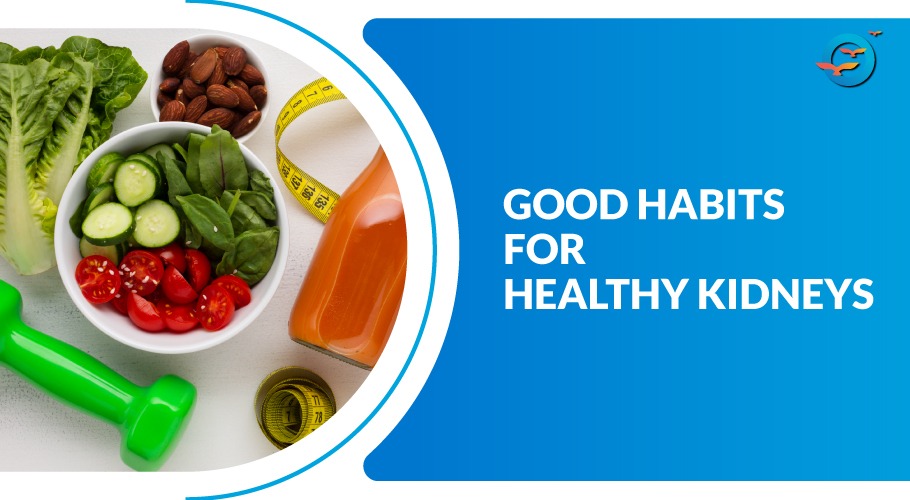Simple Habits to Keep Your Kidneys Healthy
Your kidneys are small, bean-shaped organs that play a big role in keeping you healthy. They filter waste, excess fluid, and toxins from your blood, ensuring your body functions smoothly. Besides that, they help balance minerals, regulate blood pressure, and support the production of red blood cells. Because they work silently in the background, we often don’t think much about them—until something goes wrong.
When kidneys are damaged, the effects can be serious, sometimes leading to kidney disease or even kidney failure. The good news is that you can protect your kidneys with some simple daily habits. Small lifestyle changes make a big difference in supporting kidney function and overall health.
Here are seven habits to focus on:
1. Drink Enough Water
Water is essential for your kidneys to function properly. It helps flush out waste products and toxins, making it easier for your kidneys to filter your blood. Staying hydrated also lowers the risk of kidney stones, which can be painful and harmful if left untreated.
As a general rule, aim for at least 8 cups of water a day. However, your needs may be higher if you live in a hot climate, sweat a lot, or are physically active. Instead of sugary drinks, choose plain water, infused water, or herbal teas to stay hydrated.
2. Eat a Balanced Diet
What you eat has a direct impact on kidney health. A balanced diet that includes plenty of fruits, vegetables, whole grains, lean proteins, and healthy fats supports not just your kidneys, but your entire body.
One of the biggest dietary risks for kidney health is too much salt. High salt intake raises blood pressure, and uncontrolled blood pressure is a major cause of kidney disease. Try to reduce processed and packaged foods, which are often loaded with hidden sodium. Use herbs, spices, and natural flavorings instead of salt to make your meals tasty and kidney-friendly.
3. Keep Your Blood Pressure Under Control
High blood pressure is one of the leading causes of kidney damage. When blood pressure remains elevated for too long, it puts extra strain on the delicate blood vessels in your kidneys. Over time, this can reduce their ability to filter waste properly.
Check your blood pressure regularly, especially if you are over 35 or have a family history of hypertension. If your blood pressure is high, simple steps like reducing salt, eating more fresh foods, staying active, managing stress, and maintaining a healthy weight can make a big difference. In some cases, your doctor may prescribe medication to keep it in check.
4. Manage Your Blood Sugar
Diabetes is another major cause of kidney disease. High blood sugar over time can damage the small blood vessels in your kidneys, affecting their ability to filter blood.
If you have diabetes, it’s important to monitor your blood sugar levels and follow your doctor’s guidance. A combination of healthy eating, regular physical activity, proper sleep, and prescribed medication can help you keep your blood sugar under control and protect your kidneys from long-term damage.
5. Use Painkillers with Care
Over-the-counter painkillers like ibuprofen or naproxen are commonly used for headaches, body aches, or joint pain. But taking them too often or for long periods can harm your kidneys. These medicines reduce blood flow to the kidneys, making them more vulnerable to damage, especially if you already have kidney issues.
Always use such medications sparingly and never exceed the recommended dosage. If you need pain relief frequently, consult your doctor for safer alternatives.
6. Stay Physically Active
Exercise is not just good for your heart or weight management—it’s also great for your kidneys. Regular activity helps control blood pressure, manage blood sugar, improve circulation, and reduce the risk of obesity, all of which are linked to kidney health.
Aim for at least 30 minutes of moderate exercise most days of the week. Walking, cycling, swimming, yoga, or even dancing are excellent options. Find something you enjoy so that staying active becomes part of your daily routine.
7. Limit Alcohol Consumption
Excessive alcohol intake can harm your kidneys by raising blood pressure and adding unnecessary toxins for your kidneys to filter. Drinking too much over time can lead to chronic kidney problems.
If you drink alcohol, do so in moderation. For women, that means no more than one drink a day, and for men, up to two drinks a day. Better yet, consider alcohol-free days during the week to give your kidneys a break.
Conclusion
Your kidneys work tirelessly every single day, filtering your blood and keeping your body in balance. But they need your support to stay healthy. By following simple habits like staying hydrated, eating a balanced diet, exercising regularly, and keeping blood pressure and blood sugar under control, you can protect your kidneys for years to come.
Remember to get regular checkups, especially if you have conditions like diabetes, hypertension, or a family history of kidney disease. Early detection and preventive care can make all the difference.
Taking small, consistent steps today will not only keep your kidneys strong but will also improve your overall health and quality of life.
Read more here: Maintaining Good Habits for Healthy Kidneys



